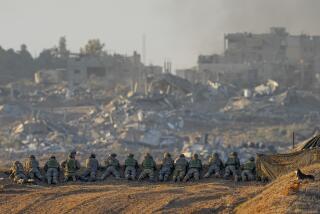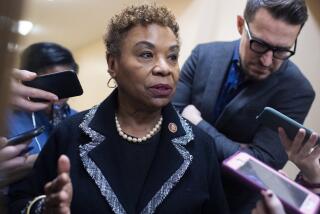Gore Assails Bush’s Stance on Iraq, Questions Motive for War
- Share via
SAN FRANCISCO — Former Vice President Al Gore delivered a searing indictment Monday of President Bush’s foreign policy and the march toward war with Iraq, saying it has undermined the fight against terrorism and could make the world a more dangerous place.
Using unusually harsh language and a sometimes mocking tone, Gore suggested Bush was exploiting tensions with Iraq for political gain and to distract, as Gore put it, from the administration’s failure to capture and punish those responsible for the Sept. 11 attacks.
For the record:
12:00 a.m. Sept. 25, 2002 For The Record
Los Angeles Times Wednesday September 25, 2002 Home Edition Main News Part A Page 2 National Desk 12 inches; 444 words Type of Material: Correction
Gore speech--An article in Section A on Tuesday on former Vice President Al Gore’s speech on Iraq cited his criticism of Vice President Dick Cheney for appearing on “The Rush Limbaugh Show.” The article noted that Cheney’s appearance, scheduled for the Sept. 11 anniversary, had been canceled. However, it had only been postponed. Cheney appeared on the show two days later.
“I do not believe that we should allow ourselves to be distracted from this urgent task simply because it is proving to be more difficult and lengthy than was predicted,” Gore said in a critique that set him apart from the rest of the prospective Democratic presidential field. “Great nations persevere and then prevail. They do not jump from one unfinished task to another.”
Further, Gore asserted that Bush’s “go-it-alone, cowboy-type approach to international affairs” risked further antagonism overseas and that some of the steps taken in the name of security at home--including the detention of suspects without legal representation--were “beyond the pale and un-American.”
“We can effectively defend ourselves abroad and at home without dimming our core principles,” Gore said. “Indeed, I believe that our success in defending ourselves depends precisely on not giving up what we stand for.”
Gore’s remarks in a 7 1/2-page speech to the Commonwealth Club in San Francisco were a dramatic departure from the low-profile, almost reclusive stance he has adopted since Bush captured the White House after the disputed 2000 election. Over the last few weeks, he was the only one of the major Democratic presidential prospects to keep his own counsel on the U.S. confrontation with Iraq.
When he finally spoke up, the severity of his tone and the prominence of his platform--a speech aired to a national radio audience--served only to intensify speculation on whether he will try another run for office in 2004. Gore teased the audience by saying he would make his decision by year’s end based on “all kinds of sophisticated” calculations, “often referred to by the scientific label ‘gut feeling.’ ”
The Commonwealth Club, a Bay Area civic affairs organization, presented a traditionally nonpartisan forum. But the political overtones--and lingering Democratic resentment over the 2000 campaign--suffused the gilded hotel ballroom.
As the former vice president stepped to the microphone, a group in the fourth row took up an a cappella version of “Hail to the Chief”--Gore smiled--and his 45-minute speech was repeatedly interrupted by cheers and applause. One woman wore a T-shirt with the 2000 “Bush-Cheney” logo rendered to read “Bush Cheated.” Another waved a sign saying “Al Gore is my president.”
Asked the inevitable question at the close of his remarks, Gore said he would make a decision in December on whether to seek the Democratic nomination to challenge Bush in 2004. Still, the day’s events had the look and feel of the campaign high season, enhanced by a rapid response from the Republican National Committee in Washington.
“It doesn’t surprise me that Al Gore doesn’t recognize leadership when he sees it,” said Mindy Tucker, a GOP spokeswoman. “He is somebody who, on important issues like foreign policy, in the past has made decisions based on political goals rather than what’s best for America.”
Reading his speech like a prosecutor’s brief, his voice rising, Gore urged Congress to reject the expansive authority and quick approval Bush has sought in dealing with Iraq, saying the president “should be urged to take the time to assemble the broadest possible international support” before he pursues any military action.
And Gore challenged the strategic doctrine Bush laid out last week, saying the asserted right to unilateral action against suspected terrorists and rogue nations could encourage other nations “to exert the same right.”
“Then the rule of law would quickly be replaced by the reign of fear,” Gore said.
While striking in its evident disdain for the president, Gore’s speech was also notable for separating him from many fellow Democrats, including his 2000 running mate, Connecticut Sen. Joseph I. Lieberman.
Lieberman and several party peers also considering a race against Bush have voiced varying degrees of support for the president’s Iraq policy, or at least seem likely to come around to the administration’s position. An exception is Vermont Gov. Howard Dean, but his skepticism has been muffled compared with the full-throated attack that Gore leveled on Monday. Afterward, leading Democrats declined to comment on Gore’s speech.
At the White House, spokesman Scott McClellan alluded to those differences. “The president has united the nation and the nation has rallied behind his call for action,” McClellan said. “He will continue to lead and unite America, even if splits begin to emerge in the Democratic Party and its candidates.” In 1991, then-U.S. Sen. Gore was one of just 10 Democrats to support Bush’s father, then president, and vote for military action against Saddam Hussein after the Iraqi invasion of Kuwait. The vote was one of the reasons Bill Clinton chose Gore as his running mate in 1992.
Gore said Monday he continues to view Hussein as a menace to his Persian Gulf neighbors, but does not view the Iraqi president as an imminent threat to the United States. For that reason, Gore said, he opposed a unilateral attack, which could estrange America’s allies and undermine their support for the war on terrorism.
“In the case of Iraq, it would be more difficult for the United States to succeed alone, but still possible,” Gore said. By contrast, he went on, the war on terrorism requires “broad and continuous international cooperation” that could be “severely damaged by unilateral action against Iraq.”
Gore’s dissent represented a political gamble of sorts, coming at a time when polls show strong public support for ousting Hussein. But his remarks should dispel the criticism of fellow Democrats who say he has been too deferential toward Bush.
Moreover, Gore could tap a vein of underlying anxiety that has developed around the administration’s assertively independent foreign policy.
“Most Americans like the United Nations,” said Benjamin Page, a Northwestern University expert on public opinion and foreign policy. “A lot of Americans are bothered about the notion of going it alone.”
In perhaps his most incendiary remarks, Gore suggested that Bush was coaxing the American people toward war with Iraq to compensate for the country’s failings in “the war against Osama bin Laden.”
“I don’t think we should allow anything to diminish our focus on the necessity for avenging the 3,000 Americans who were murdered” on Sept. 11, 2001, and “dismantling the network of terrorists that we know were responsible for it,” Gore said. “The fact that we don’t know where they are should not cause us to focus instead on some other enemy whose location may be easier to identify.”
By shifting the focus to Iraq--before even stabilizing the situation in Afghanistan--Gore asserted that Bush has drained international goodwill and filled the world with fear “not primarily about what the terrorist networks are gonna do, [but] what about what we’re gonna do.”
“Squandering all that goodwill and replacing it with anxiety in a year’s time is similar to what was done by turning a $100-billion surplus into a $200-billion deficit,” Gore added, a jibe that drew a roar from the heavily partisan crowd of several hundred.
Gore suggested Bush has politicized the conflict with Iraq to boost Republican prospects in the Nov. 5 election and to “please the portion of his base that occupies the far right.”
“The president is on the campaign trail two or three days a week, often publicly taunting Democrats with the political consequences of a ‘no’ vote” in Congress, Gore said. “The Republican National Committee is running pre-packaged advertising based on the same.
“Vice President [Dick] Cheney, meanwhile, has indignantly described suggestions of [political motivation] as reprehensible. And then the following week [he] took his discussion of the war to the Rush Limbaugh show.” (Cheney’s appearance, scheduled to observe the anniversary of the Sept. 11 attacks, was in fact canceled.)
Gore compared Bush with his father, noting that the senior Bush had waited until after the midterm elections of 1990 to schedule a congressional vote on the Persian Gulf War. But Gore also criticized the elder Bush, saying he “felt betrayed by the first Bush administration’s hasty departure from the battlefield” in 1991, which kept Hussein in power after the war.
*
Times staff writer James Gerstenzang in Washington also contributed to this report.
More to Read
Get the L.A. Times Politics newsletter
Deeply reported insights into legislation, politics and policy from Sacramento, Washington and beyond. In your inbox twice per week.
You may occasionally receive promotional content from the Los Angeles Times.











